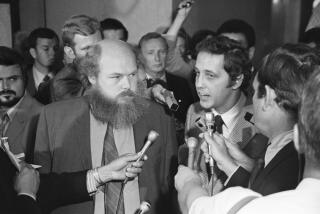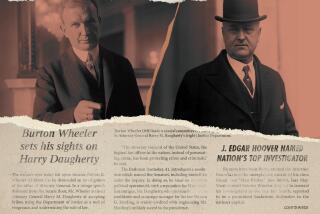Gumshoe Got an Exotic Mix of Assignments
While making his mark in tobacco investigations, private gumshoe George L. Barnes had his share of other big assignments.
In his most prominent case, Barnes was retained by lawyers for Howard Hughes’ heirs in 1976 in the celebrated battle over the quirky billionaire’s estate. Barnes helped prove that the so-called Mormon will, bequeathing one-sixteenth of Hughes’ assets to gas station operator Melvin Dummar, was a fake.
Equally strange, if less publicized, was Barnes’ role a few years later in the legal furor over Bendectin, a widely prescribed morning-sickness drug made by Merrell Dow Pharmaceuticals, a major Midwestern drug maker now owned by German chemical giant Hoechst.
In the 1980s, Merrell Dow faced dozens of lawsuits in which horrified parents claimed that Bendectin had caused their babies to be born with severe deformities.
Court records show that Barnes played an intriguing, though disputed, role in the case of Cynthia Koller, whose daughter was born with three missing limbs and a severely deformed left leg. He was retained in the case by Merrell Dow’s defense team from the prominent New York law firm of Davis, Polk & Wardwell--including senior partner Lawrence E. Walsh, the ex-federal judge who later served as independent counsel in the Iran-Contra scandal.
Three days before Christmas in 1982, a disgruntled legal secretary for Koller’s Los Angeles lawyers surreptitiously phoned Davis, Polk with some startling news. The secretary, Krystyna Janowski, claimed that she had heard Koller state that she had not used Bendectin in the critical first trimester of pregnancy, contrary to the claims in Koller’s lawsuit.
Davis, Polk immediately put Barnes on the case, court records show. By the next day, when he showed up at Janowski’s seedy Los Angeles apartment, Barnes already had the makings of a dossier on her, including a copy of her criminal rap sheet.
Janowski, resentful over her employers’ refusal to grant her time off to be with her sick baby, turned out to have a lurid past--including work as a stripper, several aliases, a history of mental illness and a criminal record for, among other things, stabbing her former husband.
Because Janowski kept changing her account of events, Barnes’ actions and other elements of her story remain murky to this day.
However, in a conversation with her employers a few days after her call to Davis, Polk, Janowski said Barnes was subjecting her to “round-the-clock harassment” by trying to bribe her or threatening to disclose her criminal past if she did not cooperate with the defense, court records show. In a written statement provided to her employers, Janowski also said she had made up the story about Koller not taking Bendectin.
But after a federal judge presiding in the case launched an investigation, Janowski reversed herself again, saying she did indeed hear Koller say that she had not taken Bendectin. Court records and rulings in the case also showed that Merrell Dow provided Janowski with substantial financial help, including a new apartment, cash and legal aid for a friend.
For her part, Koller insisted under oath that she had taken Bendectin during the first trimester. But her suit ultimately was dismissed for lack of proof that the drug had caused her child’s deformities.
In another mission in the Bendectin wars, Barnes in 1980 was dispatched to Australia to investigate an expert witness who had testified in another case against Merrell Dow.
The witness was William McBride, an Australian physician-researcher credited years earlier with alerting the world to the dangers of thalidomide.
In his book, “Killing the Messenger,” McBride told of being tipped off by an Australian security consultant that Barnes was in Sydney trying to dig up dirt.
The consultant, a former Australian navy admiral named G.J.B. Crabb, said Barnes had told him that “money is no object in achieving their aims of discrediting new witnesses.”
Ironically, years later McBride was disgraced and stripped of his medical license for fabricating data in a research study--events that were the focus of his book. There is no evidence that Merrell Dow or Barnes played a part in his downfall.
More to Read
Sign up for Essential California
The most important California stories and recommendations in your inbox every morning.
You may occasionally receive promotional content from the Los Angeles Times.










